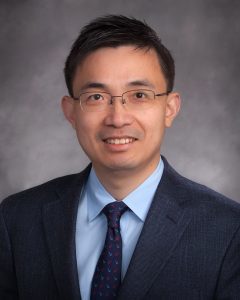Investigators
Principle Investigators
 Tim Huang, Ph.D., is Professor and Chair in the Department of Molecular Medicine at the UT Health San Antonio and Deputy Director of the NCI-designated Cancer Therapy and Research Center. He is also the holder of Alice P. McDermott Distinguished University Chair. He has been conducting studies on cancer epigenetics for the last 25 years and has pioneered the development of microarray technologies for the detection of promoter DNA methylation in solid tumors. Dr. Huang serves as the Contact Principal Investigator (PI) of our Center. Dr. Huang oversees all aspects of the center’s activities. He has been conducting studies on cancer epigenetics for the last 25 years. He has pioneered the development of microarray technologies for the detection of promoter DNA methylation in solid tumors, and he has been a mentor to many successful investigators in the field of Cancer Systems Biology. The projects of the CSBC are focused on dissecting the roles of three layers of epigenomic architectures in cancer progression specifically focusing on prostate and breast cancers. The goals of the studies to enhance our understanding of genomic regulations in cancer cells that will lead to improved individualized therapies that combat drug resistance.
Tim Huang, Ph.D., is Professor and Chair in the Department of Molecular Medicine at the UT Health San Antonio and Deputy Director of the NCI-designated Cancer Therapy and Research Center. He is also the holder of Alice P. McDermott Distinguished University Chair. He has been conducting studies on cancer epigenetics for the last 25 years and has pioneered the development of microarray technologies for the detection of promoter DNA methylation in solid tumors. Dr. Huang serves as the Contact Principal Investigator (PI) of our Center. Dr. Huang oversees all aspects of the center’s activities. He has been conducting studies on cancer epigenetics for the last 25 years. He has pioneered the development of microarray technologies for the detection of promoter DNA methylation in solid tumors, and he has been a mentor to many successful investigators in the field of Cancer Systems Biology. The projects of the CSBC are focused on dissecting the roles of three layers of epigenomic architectures in cancer progression specifically focusing on prostate and breast cancers. The goals of the studies to enhance our understanding of genomic regulations in cancer cells that will lead to improved individualized therapies that combat drug resistance.
Victor Jin, Ph.D., is  a Professor in the Department of Molecular Medicine at UTHSCSA. He also has a joint appointment in the Department of Epidemiology and Biostatistics. Dr. Jin has more than 15 years of experience in developing statistical methods, machine learning algorithms, and software tools for analyzing omics-seq data, including those derived from ChIP-exo, ChIP-seq, MBDCap-seq, Hi-C, RNA-seq and miRNA-seq. Dr. Jin serves as a PI along with Drs. Tim Huang and Qianben Wang in our Center oversees all aspects of computation modeling and data management and facilitates intra and inter-center communication between computational and experimental scientists. In particular, he and Dr. Huang co-leads Project 3 about three-dimensional transcriptional regulation as well as leads computational modeling in nucleosome regulation in cancer progression. He is also responsible for managing the core of data analyses and management.
a Professor in the Department of Molecular Medicine at UTHSCSA. He also has a joint appointment in the Department of Epidemiology and Biostatistics. Dr. Jin has more than 15 years of experience in developing statistical methods, machine learning algorithms, and software tools for analyzing omics-seq data, including those derived from ChIP-exo, ChIP-seq, MBDCap-seq, Hi-C, RNA-seq and miRNA-seq. Dr. Jin serves as a PI along with Drs. Tim Huang and Qianben Wang in our Center oversees all aspects of computation modeling and data management and facilitates intra and inter-center communication between computational and experimental scientists. In particular, he and Dr. Huang co-leads Project 3 about three-dimensional transcriptional regulation as well as leads computational modeling in nucleosome regulation in cancer progression. He is also responsible for managing the core of data analyses and management.
 Qianben Wang, Ph.D., is a Professor in the Department of Pathology at Duke University School of Medicine. Dr. Wang’s research focuses on studying multi-layer transcription regulatory networks of nuclear receptors (e.g. androgen receptor and glucocorticoid receptor), pioneer transcription factors (e.g., FOXA1), transcription coactivators (e.g., Mediator and histone acetyltransferases), and epigenetic regulators (e.g., histone modifications and chromatin looping) in hormone-related cancers. Dr. Wang has made high impact contributions to this field, particularly in understanding genome-wide transcriptional regulation by nuclear receptors. Dr. Wang serves as a PI to provide oversight for Project 2 tasks and outreach and administrative activities performed at Duke. Dr. Wang is also Experimental Leader of Project 2.
Qianben Wang, Ph.D., is a Professor in the Department of Pathology at Duke University School of Medicine. Dr. Wang’s research focuses on studying multi-layer transcription regulatory networks of nuclear receptors (e.g. androgen receptor and glucocorticoid receptor), pioneer transcription factors (e.g., FOXA1), transcription coactivators (e.g., Mediator and histone acetyltransferases), and epigenetic regulators (e.g., histone modifications and chromatin looping) in hormone-related cancers. Dr. Wang has made high impact contributions to this field, particularly in understanding genome-wide transcriptional regulation by nuclear receptors. Dr. Wang serves as a PI to provide oversight for Project 2 tasks and outreach and administrative activities performed at Duke. Dr. Wang is also Experimental Leader of Project 2.
Project Leaders and Co-Investigators
Zhijie (Jason) Liu, Ph.D., is an Assistant Professor in the Department of Molecular Medicine at UTHSCSA. Dr. Liu is the experimental Project Leader in Project 1. He studies the changes of DNA regulatory elements that are controlled by sex hormones in either breast or prostate cancer as a molecular biologist. Dr. Liu is an expert on various genomics high throughput assays, and he will use these cutting-edge technologies to characterize the dynamic assembly of enhancer activation machinery during cancer hormone resistance progression.
Jianhua Ruan, Ph.D., is an Associate Professor in the Department of Computer Science at The University of Texas at San Antonio. Dr. Ruan will work closely with Dr. Zhijie (Jason) Liu on computational modeling of mega genomic assemblies composed of regulatory proteins and DNA and function during cancer progression. He will build efficient and effective computational tools to analyze and model the vast amount of data generated in this project; with these tools, Drs. Ruan and Liu will together characterize and compare regulatory networks between hormone-resistant and hormone-sensitive cancers, and develop machine learning algorithms that can utilize the derived network features to predict patient response to endocrine therapies.
Chun-Liang Chen, Ph.D., is an Assistant Professor in the Department of Molecular Medicine at UTHSCSA. Dr. Chen is involved in developing methods for isolation and ex vivo expansion of circulating tumor cells (CTCs) for single-cell epigenome analysis. During metastasis that leads to cancer fatality, tumor cells are shed into bloodstream and colonized in distant organs. The expanded CTCs will open an important window to understanding the metastatic epigenetic mechanism of cancer and facilitate high throughput drug susceptibility screening for precision personalized medicine. Wei Li, Ph.D., is a Professor in the Department of Molecular and Cellular Biology at Baylor College of Medicine. Dr. Li is a computational Project 2 Leader and develops a computational model to determine AR/ERα or FOXA1-mediated nucleosome positioning and spacing and be responsible for interactions with other investigators in the U54 project. He has collaborated with Dr. Wang since 2005 and they have published many collaborative papers in high impact journals.
Seth Frietze, Ph.D., is an Assistant Professor in the Department of Medical Laboratory and Radiation Sciences at the University of Vermont. Dr. Frietze is a Co-Investigator in Project 3. He has been collaborating with Dr. Victor Jin for more than eight years, and both investigators have joint publication is genomics studies. Specifically, he works with Dr. Jin’s team member, Dr. Yufan Zhou to set up TCC and ChIP-seq protocols for the proposed experiments.
Nameer Kirma, Ph.D., is an Associate Professor in the Department of Molecular Medicine at UTHSCSA. Dr. Kirma leads the outreach core of the U54 Center at the San Antonio site. The goals of the core are to enhance the awareness and knowledge of cancer systems biology, recruit next-generation trainees interested in genomics studies, and expand the scope of early-stage and established investigators to engage in whole-genome scale studies as part of their research portfolio. This includes seminar series, annual symposia, workshops, and summer research programs that will provide didactic and practical training of novel technologies and advances in genomic interactions in cancer. The outreach program will promote the development of a new generation of scientists, focusing on underserved populations, to advance Cancer-related studies at the systems, whole-genome level.
Pearlly Yan, Ph.D., is a Research Assistant Professor in the Department of Internal Medicine at Ohio State University. Dr. Yan is a Co-Leader in the outreach core, and leads the outreach effort in the OSU site and will work closely with Dr. Nameer Kirma and Dr. Qianben Wang for the proposed tasks. Dr. Yan has worked closely with Dr. Huang (Contact-PI) and Dr. Wang (PI at Duke) in research projects, publications and trainee mentoring.
Virginia Kaklamani, M.D., is a Professor of Medicine in the Division of Hematology/Oncology at UT Health San Antonio. Dr. Kaklamani is a leader of the Breast Cancer Program. Michael Liss, MD., is an Assistant Professor in the Department of Urology at UT Health San Antonio. Drs. Kaklamani and Liss are Co-Investigators in Projects 1 and 3. As clinical investigators, both will closely work with the basic scientists within the Center and provide a resource of cancer patient samples for the targets validations and for facilitating the translational studies.
Jiaoti Huang, M.D., Ph.D., is Professor and Chairman of Department of Pathology at Duke University School of Medicine. Dr. Huang is a Co-Investigator in Project 2 and provides pathological support for PDX samples and patient samples. Dr. Huang has collaborated with Dr. Wang since 2012.
